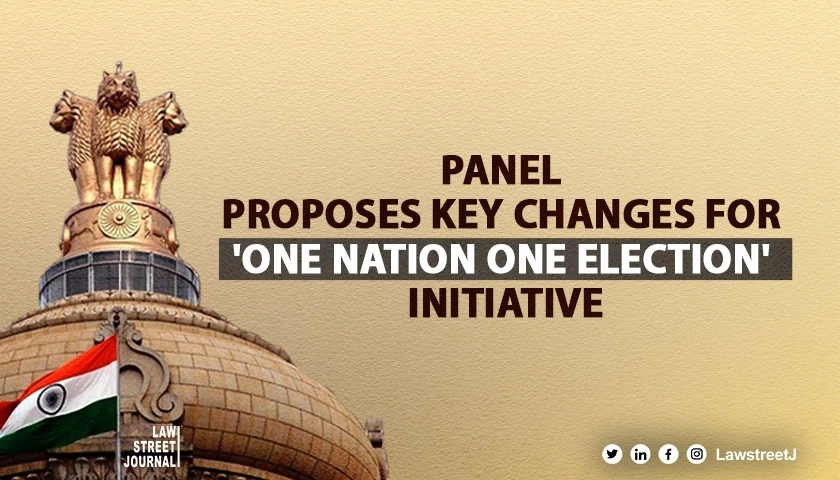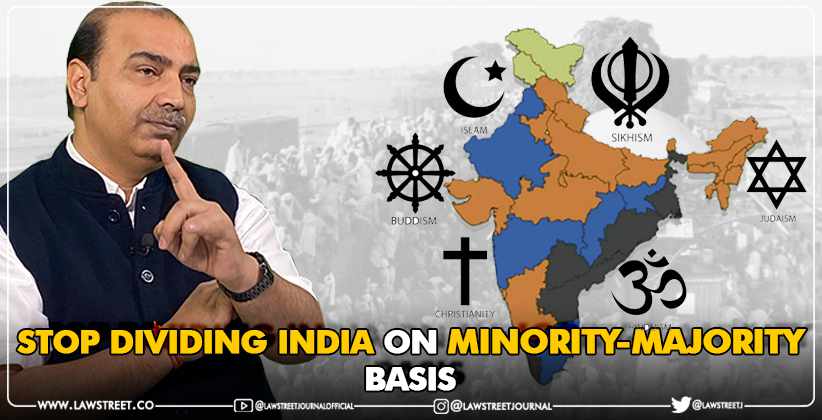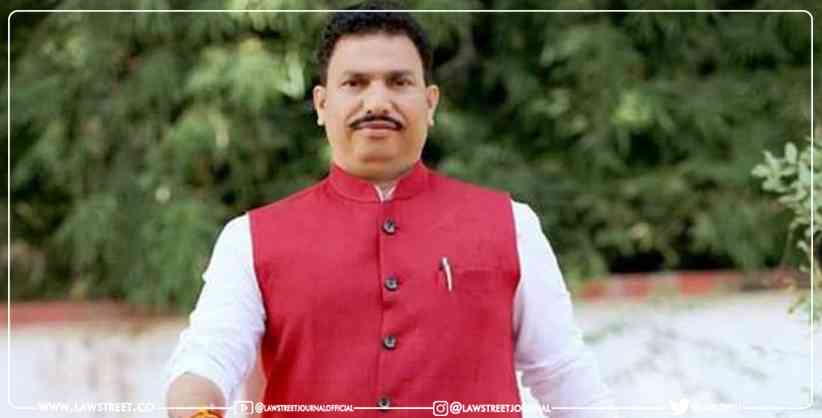NEW DELHI: A high-powered committee led by former President Ram Nath Kovind has finally submitted its report on One Nation, One Election to the Honble President Smt. Droupadi Murmu. The committee after studying the suggestions received from political parties, experts, and other stakeholders has backed the idea of having simultaneous elections in the country.
The committee unanimously agreed that holding simultaneous elections would bring about a significant transformation in the electoral process and overall governance. Further, it has also concluded that simultaneous elections can also help to maximize limited resources and motivate more voters to participate in the electoral process. Further, the mitigating measures will also address the disruptions to governance and policy paralysis caused by the application of the Model Code of Conduct, ultimately minimizing its adverse impact on the economic growth of the nation.
The proposed Constitutional Amendments outline potential changes to the Indian Constitution concerning electoral processes and legislative terms. The First Bill addresses various provisions, including modifications to the duration of the House of People and State Legislature Assembly, without necessitating state ratification. On the other hand, the Second Amendment seeks to modify the process of preparing the electoral roll and suggests holding simultaneous elections for Municipalities, Panchayat, and general elections. This would require ratification from at least half of the states, as it has significant implications for State affairs. These amendments seek to simplify electoral procedures and coordinate elections across various levels of governance within India.
FOLLOWING AMENDMENTS IN THE CONSTITUTION OF INDIA HAVE BEEN SUGGESTED BY THE COMMITTEE
Amendment to Article 83(2)
The House of the People, unless sooner dissolved, shall continue for five years from the date appointed for its first meeting and no longer and the expiration of the said period of five years shall operate as a dissolution of the House
Herein the committee has proposed to substitute Five years as mentioned under Article 83(2) to a Full term.
Introduction of Article 83(3)
It will define "unexpired term," which will be the period between the date of dissolution of the House, in case it is dissolved before the expiry of the full term, that is five years, and the remaining period left for the completion of the full term. In case elections are conducted after such dissolution, the House of People constituted pursuant to it shall continue for a period equal to the unexpired term of the preceding House.
Introduction of Article 83(4)
The House of People constituted shall not be a continuation of a previous House of the People. The election for constituting the House of the People for its unexpired term shall be referred to as a mid-term election, and the election held after the expiry of the full term shall be referred to as the General Election.
Further, with reference to the State Legislatures, similar changes have been suggested to Article 172.
Introduction of Article 82A (1)
This proposed amendment will give powers to the President to notify the Appointed date which will be on the date of the first sitting of the House of the People after a general election.
Introduction of Article 82A (2)
Notwithstanding anything in Articles 83 and 172, all the State Legislative Assemblies constituted in any general election, after the Appointed date shall come to an end on the expiry of the full term of the House of the People.
This means that once the transition provisions are put into effect, the tenure of all legislatures that were created in any election that took place after the appointed date would eventually come to an end on the expiration of the complete term of Lok Sabha, regardless of the time at which the assembly was initially constituted. As a consequence of this, the Lok Sabha and all of the legislatures would be prepared for a simultaneous election after this term. Afterward, the modifications that are being proposed to the terms of office for the Lok Sabha and the assemblies will guarantee that synchronization is preserved.
Introduction of Article 82A (3)
This Article would empower the Election Commission to conduct general elections and legislative assembly polls simultaneously.
Introduction of Article 82A (4)
This proposed article gives power to the Election Commission to make a recommendation to the President to declare by an order that the elections to any particular Legislative assembly cannot be conducted at the time of the General Election and that the election to that legislative assembly may be conducted on a later.
Introduction of Article 82A (5)
In case the elections to any legislative assembly are deferred then the full term of such an elected body shall end on the same date as the end of the full term of the Parliament constituted in the General Election.
Introduction of Article 324A
This proposed article would empower the Parliament to make appropriate laws to ensure that the elections to municipalities and panchayats are held simultaneously with general elections.
Introduction of Article 325 (2)
This proposed insertion would enable the introduction of a single electoral roll for every territorial constituency for election to the House, Legislature, Municipality, or Panchayat. Further, it clarifies the intent by adding that No person shall be ineligible for inclusion in any such roll or claim to be included in any special electoral roll for any such constituency on grounds only of religion, race, caste, sex or any of them.
Introduction of Article 325(3)
This proposed insertion further clarifies that the electoral rolls as mentioned above shall be made by the Election Commission, in consultation with the State Election Commissions which would thereby substitute any electoral roll prepared earlier by either the Election Commission under Art 325 or the State Election Commissions under Art. 243K and Art. 243ZA.
Amendment to Article 327
Lastly, an amendment has been proposed to Article 327 which deals with the power of the Parliament to make provisions concerning elections to Legislatures. The panel proposes to amend it by adding the words "conduct of simultaneous elections" after delimitation of constituencies
Apart from these amendments to the Constitution of India the panel has also suggested some amendments to section 5 of the Government of National Capital Territory of Delhi Act, 1991, section 5 of The Government of Union Territories Act, 1963, and Section 17 of Jammu and Kashmir Reorganisation Act, 2019 to give effect to "unexpired term" in the respective assemblies.
The Committee in the conclusion of its report has quoted the principles laid down by the Honble Supreme Court of India in Kesavananda Bharati v. State of Kerala (1973 4 SCC 225), wherein the court has held that Every Constitution is expected to endure for a long time.
Therefore, it must necessarily be elastic. It is not possible to place the society in a straitjacket. The society grows, its requirements change.
The Constitution and the laws may have to be changed to suit those needs. No single generation can bind the course of the generation to come. Hence every Constitution, wisely drawn up, provides for its amendment.
The notion amongst many that the idea of having a One Nation One Election is unconstitutional is not correct as it is evident that the Constitution-makers intended for simultaneous elections for the House of the People and the State Legislative Assemblies. In addition, they ensured that their terms would align for five years, allowing them to be concurrent, as stated in Articles 83 and 172. Moreover, the elections for the Lok Sabha and the state assemblies were held simultaneously in 1952, 1957, 1962, and 1967. Unfortunately, the simultaneous election cycle was disrupted due to the premature dissolution of some Legislative Assemblies in 1968 and 1969.
These events resulted in the breakdown of the cycle of simultaneous elections in India. But now India has the opportunity to establish a system of having simultaneous elections which will not only be beneficial in saving a huge amount of public money that is spent in conducting polls for various states but also will strengthen the entire idea of democracy by aiding in good governance.





![Number of Constitution bench matters reduced drastically over decades, Lok Sabha informed [Read Statement]](/secure/uploads/2023/08/lj_1613_Constitution_bench_cases_sc.jpg)
![Only Central Govt empowered to undertake census, Centre tells Supreme Court [Read Affidavit]](/secure/uploads/2023/08/lj_7449_9c75a532-6157-429f-be90-4805dbb8a2ee.jpg)




